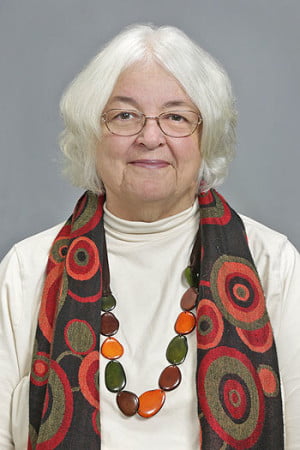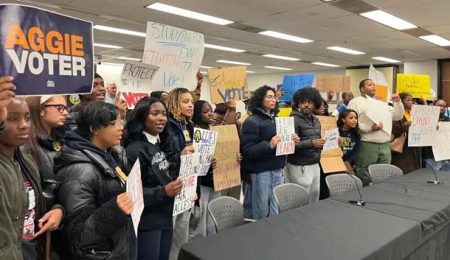They’re Ba-a-ack!
“Forward Together, Not One Step Back;” Mapping North Carolina’s Future; and a Primer on the Primary.

Photo: Tim Barnwell
Legislative News by Nelda Holder –
They’re back—and on Valentine’s Day, no less. Such a whimsical occasion for the North Carolina General Assembly to open for business again.
But in this session, the 50 members of the Senate and 120 members of the House will include some retiring members in their last session; some members whose sights are now set on higher ground; and a number who hope to hold onto their seats in the coming election this fall.
Interestingly, they’ll have just over two weeks for business before someone else comes back to town. The “Rev. Barber Army”—a mass march on Saturday, March 2, called the “Poor People’s and Low Wage Workers’ State House Assembly and Moral March”—will be hitting the capital city and bringing back memories of Raleigh’s years of hosting the Moral Monday marches on Jones Street.
The Rev. Dr. William J. Barber II, currently a professor and founding director of the Center for Public Theology & Public Policy at Yale Divinity School, was at the forefront of the pesky (to some legislators) Poor People’s Campaign that began in North Carolina in 2007. That developed into the well-known “Moral Monday” civil-rights protest marches through a coalition known as “Historic Thousands on Jones Street People’s Assembly.
In 2017 he took his Poor People’s Campaign national, calling for a moral revival throughout the country through Repairers of the Breach—an organization he and co-chair Rev. Dr. Liz Theoharis founded to address the needs of the 15 million poor and low-wage voters in more than 30 states.
“Forward Together, Not One Step Back”
Barber’s current organization will take that familiar battle cry back to the doors of political power in Raleigh, and add it to a number of other state capitals across the country to protest “Poverty and low wages, lack of healthcare, underfunded public education, voter suppression, and environmental collapse,” according to the organization’s announcement, noting that “over 40% of the state are poor or low-income: over 4 million residents”; nearly 2 million North Carolinians earn less than a minimum living wage of $15/hour—35% of the workforce.
Barber’s statement cautions that in North Carolina, there are “3,464,018 poor and low-income eligible voters, including 107,347 Latino voters, 26,403 Asian voters, 885,990 Black voters, and 34,966 Indigenous voters.” These numbers account for 41.45% of the electorate in the state.
His announcement notes that the rally is part of a multi-state (30 states) show of concern that will include 40 weeks of action beginning February 5 and leading to the November elections. The concern is aimed at the “deceptive and deadly attacks aimed against Black and civil rights history, women, the LGBTQ+ community, workers, immigrants, students, teachers, and everyday North Carolinians, while making it easier to get a gun and easier to poison our water.”
North Carolina participants will gather at 10 a.m. for a short program followed by the 11 a.m. march to the NC General Assembly, 16 W. Jones Street. You may want to read their their “Third Reconstruction Agenda” in preparation.
Mapping North Carolina’s Future
Should North Carolina’s citizens expect to receive “fair” redistricting maps from their legislature? Former NC Supreme Court justice Bob Orr (R), well-known as a good-government activist since he left the court, thinks so.
As a result, he has filed a lawsuit in Wake County Superior Court against the state for depriving voters of such fairness, even as voting gets underway here for 2024 with in-person early voting beginning February 15 for the March 5 primary. Presented on behalf of on behalf of several named representative voters directly affected by the most recent redistricting, the suit also, and importantly, speaks to the effect on all the citizens of the state.
The suit argues that the right to “fair elections” is an “unenumerated right” reserved by the people and “fundamental to the very concept of elections and the underpinnings of democracy. Without ‘fair’ elections, the framework of our government would rest not on principle and the will of the people, but instead, on partisan politics, exercised not by political parties or particular entities, but by the heavy hand of government itself….”
Orr’s rationale is that the legislature’s Republican majority in 2023 produced redistricting maps that violate the concept of “fair,” in that they so skewed certain districts to be non-competitive that voting for some 170 seats in the legislature is expected to be competitive in only “about a dozen” cases. And only one of 14 races for the US House of Representatives is expected to be competitive. Orr calls that a violation of the state’s guarantee of fair elections and demands that several specific districts be thrown out of court.
Bringing Back Memories
Orr’s legal argument brings up several egregious facts from last year’s period of redistricting, one being manipulation of hearings so as to deprive the citizens of the state of fair opportunity for input on the maps. He reminds us that the information on apportionment for congressional and legislative districts (with underlying population data) was released to the public on October 18, 2023. This was followed in short order by three limited public hearings for the entire state over the next few weeks, after which “95 percent of the census blocks utilized … remained as originally created by the secret process with only minor technical changes taking place prior to passage.”
The lawsuit proclaims: “By intentionally manipulating the electoral odds and stacking the electorate to give an unfair electoral advantage to a particular political party and its candidates in selected districts, the General Assembly has attempted to preordain the outcome of elections in certain districts.”
Orr follows that statement with a discussion of the technical deviance incorporated in the redistricting plan that egregiously skewed the map in Districts 6 to the point that no Democratic, Libertarian, nor Green Party filed to run, while six Republicans became candidates in a once-competitive district. In District 13, also previously competitive, changes were made that caused the current Democratic incumbent, Congressman Wiley Nickel, not to file for reelection, moving that district from competitive to non-competitive.
And in Congressional District 14, in perhaps one of the most inflammatory moves of all, Democratic incumbent Congressman Jeff Jackson has also declined to file for reelection (although two new Democrats did file for the seat). But three Republicans—including (slight cough and throat-clearing sound effects here) the “current Speaker of the House,” put their names on the ballot. That “Speaker” is Tim Moore, the same speaker presiding over the House in this upcoming legislative session.)
Let me highly suggest you take a few moments and read this lawsuit, online at www.ncforfairelections.com. It’s an esoteric argument but grounded in the concept of “free elections,” and well worth giving it some thought!
Primer on Primary
The March 5 primaries will be here before you know it! Every seat in the NC Carolina General Assembly is up for election, along with the state’s highest offices: governor, lieutenant, governor, attorney general, secretary of state, state treasurer, superintendent of public instruction, commissioner of agriculture, commissioner of insurance, secretary of labor, state auditor. Not to mention more local elections (think state representatives, judges, district attorneys, county commissions….).
Is your registration up to date? Do you have a photo ID available (new requirement this year)? Need to know where to vote? Any other questions? Find any information you need simply by calling the Buncombe County Election Services at (828) 250-4200, or visiting their website, where you can find sample ballots and other comprehensive voting information.
Go vote! It’s fun!
Nelda Holder is the author of The Thirteenth Juror – Ferguson: A Personal Look at the Grand Jury Transcripts.







